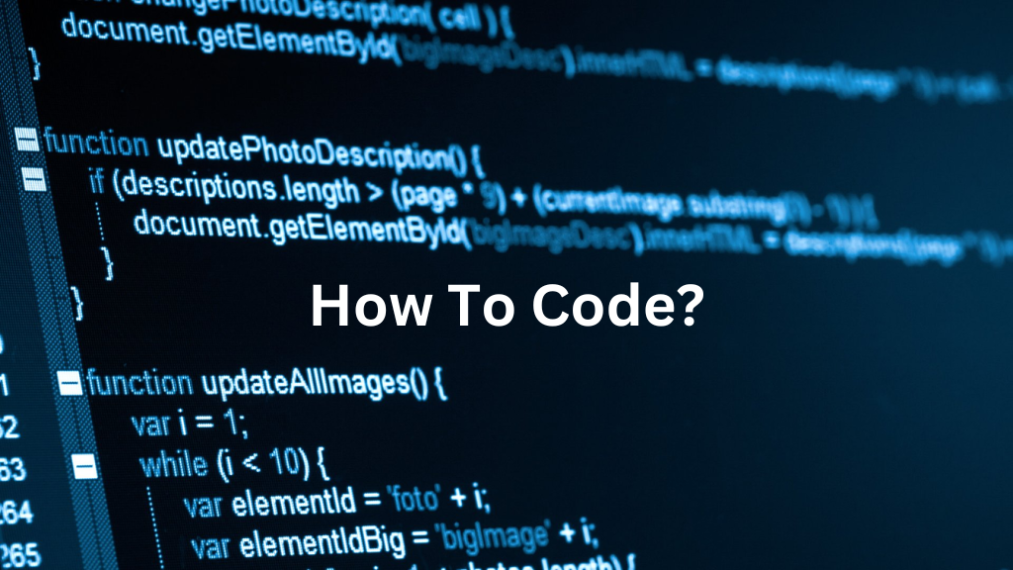So, you’ve decided to plunge into the world of coding? Great decision! Coding is an essential skill in the current digital age, and learning how to code can open up many opportunities for you. But where should you start? Don’t worry. In this article, we’ll walk through the basics of coding, providing step-by-step guidance to help you navigate this exciting journey. Let’s divLet’s
Before we get started, it’s essential to understand what coding is. In its simplest form, coding is using a programming language to get a computer to behave how you want it to. Every line of code tells the computer to do something, and a document full of lines of code is called a script. Each script is designed to carry out a job. This job might be simple, like adding up the numbers from 1 to 10, or it could be something much more complex, like creating a video game.
What you’ll this article will be summarised as follows:
- The basics of coding
- Choosing the correct programming language
- Understanding coding syntax
- How to practice coding effectively
- Resources to help you continue your coding journey
Whether you’re a beginner or have done coding before, this guide will give you a solid foundation to build upon. Let’s get on this coding journey together!
What Are Some Common Challenges Faced By Beginner Coders?

Stepping into the world of coding can be both exciting and overwhelming. As a beginner, you may face a multitude of challenges. Let’s expect some of these common hurdles so you can better anticipate them and learn practical strategies to overcome them.
Understanding Complex Concepts
The first big hurdle you may face is grappling with complex coding concepts. These concepts often seem foreign, from data structures to algorithms.
However, remember that every coder has been where you are now. The key is to break down these complex ideas into smaller, manageable parts. This approach makes them less intimidating and easier to understand.
Learning the Syntax
Another major challenge is learning the syntax of a new programming language. The syntax refers to the rules that dictate how programs written in a particular language should be structured. Every language has its unique syntax, which can confuse beginners.
But don’t wordon’tith consistent practice and repetition, you’ll become familiar with the syntax of your chosen language.
Problem-Solving
Problem-solving is a vital skill in coding. As a beginner, you might find it challenging to think algorithmically and solve coding problems. But don’t be discouraged. Developing your problem-solving skills takes time and practice.
Debugging
Debugging is another aspect of coding that often frustrates beginners. Finding and fixing errors in your code can be a tedious and time-consuming process.
However, debugging is an essential part of coding. It helps you correct your mistakes and deepens your understanding of how the code works and how to improve it.
Keeping Up With Rapidly Changing Technologies
Technology evolves at a fast pace, and so do programming languages and tools. As a beginner, you might feel overwhelmed by the constant need to learn new things.
It’s essential to remember that while staying updated is critical, it’s crucial to have a solid foundation in the basics. Once you have the fundamentals, you’ll find adapting to new technologies much more accessible.
How Can I Start Building My Coding Projects?

Embarking on your journey to build your coding projects can feel daunting, but with a step-by-step approach, you will find it an enriching experience. To get you started, follow these steps:
Identify Your Interest
First, it’s crucial to identify an area of interest. It could be anything from creating a personal website, developing a game, or building a mobile application. The key is to choose something you are passionate about, as it will keep you motivated throughout the learning process.
Learn the Basics
Once you’ve done your project, it’s time to learn the basics of the coding languages needed to buy your website; HTML, CSS, and JavaScript are good starting points. If you’re insourced in mobile applications, you might want to start with Java for Android or Swift for iOS.
Experiment
As you learn, practice by writing simple programs. This will help you understand the syntax and structure of the language. Don’t be Don’td to make mistakes. Making errors is an essential part of the learning process. Experiment with different codes and see what works and what doesn’t.
Start Building
With the basics under your belt, you are ready to start working on your project. Begin with a simple version of your project and gradually add complexity as you become more comfortable. For instance, when buying a website, start with a basic layout before adding interactive elements like buttons and forms.
Ask for Help
Don’t hesitate to seek help when you’re online. Communities like Stack Overflow, GitHub, and coding forums are excellent places to ask questions and learn from other coders. They can offer invaluable advice and solutions to the problems you might encounter.
Regular Practice
Remember, regular practice is the key to mastery. Make coding a daily habit, even for a short while. This will help you improve your skills and keep your knowledge fresh.
What Are Some Common Programming Frameworks And Libraries?
Figuring out how to code can sometimes seem impossible, especially if you’re a you’re. The various complex concepts, diverse syntaxes, and endless need for problem-solving can be overwhelming. However, mastering coding doesn’t have to be paved with difficulties. With the right approach, anyone can learn to code and enjoy the process.
This article explains beginner coders’ most common challenges— from understanding intricate concepts and learning unique syntaxes to debugging and keeping up with rapidly changing technologies. But fear not! We’ll also provide some valuable tips on how to overcome these challenges.
Beyond discussing these challenges, this guide will offer a step-by-step process to help you build your coding projects well by identifying your interests, learning the basics, experimenting, creating to develop, seeking help, and committing to regular practice.
Lastly, we’ll introduce you to some common programming frameworks and libraries. Having a basic understanding of these tools will give you a solid foundation to build upon. So, this article will provide valuable insights and resources, whether you’re furthering your coding journey or looking to enhance your existing skills.
What Are The Career Opportunities For Coders?
A World of Opportunities
As a coder, you have many career opportunities at your disposal. Your coding skills can offer options in nearly every industry, from startups to established tech giants, innovative agencies, and non-profit organizations.
Tech Industry Careers
Within the tech industry, coding skills can land you roles such as:
- Software Developer: Here, you could be designing, testing, and developing software to meet users’ needs.
- Web Developer: You might create and maintain websites or web applications using coding languages like HTML, CSS, and JavaScript.
- Mobile App Developer: You could use your skills to design and build applications for mobile devices, like smartphones and tablets.
- Data Scientist: This role involves analyzing and interpreting complex digital data to help companies make decisions.
- Database Administrator: Database administrators use coding to analyze and secure their company’s data.
Expanded Horizons
Moreover, coding skills can transcend the tech industry. In today’s world, nearly every business has a digital footprint and thus needs individuals with coding skills. Whether it’s finance, healthcare, entertainment, or education, these sectors increasingly seek professionals who can code. So, you might find yourself in roles such as:
- Sales Engineer: You could integrate and demonstrate tech products to potential customers here.
- Content Manager: You might be managing and updating a company’s content using a Content Management System (CMS), which requires an understanding of HTML and CSS.
- Technical Writer: You could create technical documentation, guides, and manuals for software products.
Freelance Opportunities
In addition to company-based roles, freelancing is another viable career path for coders. Many businesses hire freelance coders for project-based work, which can give you flexibility regarding your workload and schedule.
The Future Is Bright
The future of coding looks bright. With the continued expansion of the digital world, the demand for coding skills is only expected to increase. So, whatever your career goals, coding can open the door to various fulfilling and exciting opportunities.
Conclusion
The journey of becoming a proficient coder is filled with challenges and rewards. The learning process is continuous from grappling with complex concepts and the syntax of various programming languages to improving your problem-solving skills and staying abreast of rapidly changing technologies. However, it is worth the time and work spent. With many career opportunities in the tech industry and beyond, the world is your oyster when you have coding skills.
Beyond the job market, coding also opens up the possibility of creating your projects. This could be anything from a personal blog to a sophisticated software application. Start by identifying your area of interest, learn the basics of coding, experiment, build, and don’t be afraid to help. Practice regularly to hone your skills and keep up with the latest developments.




